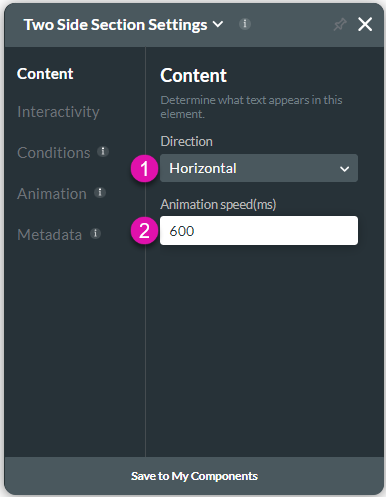Two Side Section Settings
The two-sided section container is configured using the Two Side Section Settings screen.
The following options are available:
Content
Customize the content options and determine how other elements appear in the two side section container.

| # | Option | Function |
|---|---|---|
| 1 | Direction | The Direction option is used to flip the contents of the container vertically or horizontally. |
| 2 | Animation speed (ms) | You can set the speed at which the container will flip in milliseconds. |
Interactivity
Customize the interactivity options and determine how your user can interact with the two side section container.

| # | Option | Function |
|---|---|---|
| 1 | Hide onload | Use the Hide Onload option to hide specific elements on load to control what the user sees. It allows you to hide an element when the page is loaded. |
| 2 | Confirmation | Use the Confirmation function to add customized confirmation messages to clickable elements. Only after the user confirms the element’s action triggers. The Confirmation option is available for different elements, including buttons, shapes, images, text, etc. Use the confirmation function to confirm your user’s choices. |
| 3 | Configure On Click Action | Use the Configure On Click Actions to run actions upon clicking. The On Click Actions option is available for multiple elements, such as text, buttons, shapes, images, and more. |
Conditions
Configure Conditions – Determine what will happen when your user interacts with this element.
Animation
Animation – This option allows you to add visual interest to your screen. Create the illusion of movement when the element shows on the screen. You can set the duration and delay to control the movement and preview by default.
Metadata
Metadata – See how this element is identified in the backend, such as its purpose, content, or function. Your users won’t see this.

